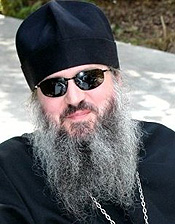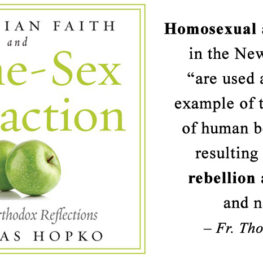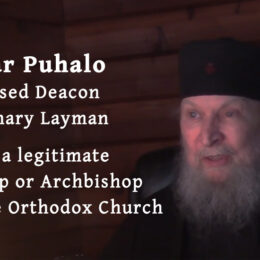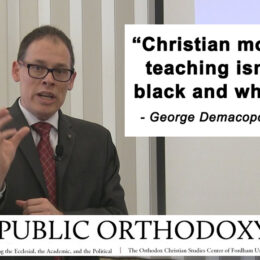
In response to the debate about homosexuality that is currently going on in the OCA, there is now an “Open letter to OCA Holy Synod from college students and young adults” that has been sent to the bishops of the OCA, and is making the rounds on the internet.
This letter is a classic example of the use of politically correct arguments to shut down those whom liberals disagree with, rather then deal with the actual substance of the question. This tactic is not by accident. When you can’t deal with the substance of an issue, complaining about the tone of those you can’t answer will do, in a pinch.
In short, the letter complains about the tone of those who say homosexuality is a sin, without unequivocally stating what the correct teaching of the Church actually is on the subject. There is no acknowledgment that statements that are morally ambiguous might be of any legitimate concern, only condemnation of those who seek to make clear what the teaching of the Church is.
The Open Letter states that
“On public and easily accessible Internet postings, Orthodox clergymen — including OCA priests — repeat disgusting and discredited theories about the etiology of same-sex attraction; liken gay people to “old perverted men who love little boys”; tell Orthodox Christians that homosexuality “should make our stomachs turn and make us vomit”; call for “spiritual warfare” against those in the Church who advocate a more restrained pastoral approach; and accuse those who speak up for gay people of being “homosexual activists,” publicly expressing hope that they will leave the Orthodox faith.”
Of course, the “more pastoral approach” is from those who openly question the historic position of the Church on the subject. The mean people are the ones that stand for the Tradition of the Church. But if you actually examine the “unpastoral” words that they have in mind, and then compare them to the 4th Homily of St. John Chrysostom on the book of Romans, you will see that St. John Chrysostom was apparently not very pastoral either.
The last line here seems to be in reference to my own words. It is hyperlinked in the original version to an article about Bishop Matthias’s letter, and the first comment is my own:
“Everyone should ask their bishops to issue a similar statement… with one additional point that needs to be made very clear: clergy or laity who publicly teach contrary to the moral and dogmatic teachings of the Church — on this or any other issue — should understand that there are canonical disciplinary consequences that will be enforced for the protection of the flock. The job of a shepherd is not just to feed the sheep, but also to chase away the wolves.”
Now, this is hardly an expression of hope that people who struggle with homosexuality will leave the Church. This is a very Biblical reference to the Bishop’s role as a shepherd of his flock (John 10:1-16; Acts 20:28), and those who would lead the flock astray are often spoken of as “wolves” (Acts 20:29), even “wolves in sheep’s clothing” (Matthew 7:15). The Fathers of the Church likewise use such imagery. St. Gregory Nazianzus wrote:
“..the good shepherd who laid down his life for the sheep has not even now left us; but is present, and tends and guides, and knows his own, and is known of his own, and, though bodily invisible, is spiritually recognized, and defends his flock against the wolves, and allows no one to climb over into the fold as a robber and traitor; to pervert and steal away, by the voice of strangers, souls under the fair guidance of the truth.” Oration XVIII: On the Death of his Father.”NFPF2, vol. 7, p. 255f.
St. Didymus the Blind, commenting on Acts 20:28, wrote:
“…it not only says that bishops must pay heed to themselves but also to the flock that the Savior acquired by his blood. And just as he will not fall if he is attentive to himself by taking care for both the requisite virtues and his faith… so also he must take care for the flock by turning away from it the wolves who are falsely called apostles and who, being ravenous, live on the ruin of the flock…. Now he turns away these wolves, if he, established by the Holy Spirit to oversee the church, is a good shepherd” (Catena on the Acts of the Apostles 20:28, quoted in Ancient Christian Commentary on Scripture: New Testament, vol. 5, p. 254f).
Of course any verbal image can be pressed too far. Obviously, though we speak of those who would lead the flock astray as wolves, unlike actual wolves, such people can repent, and rejoin the flock as real spiritual sheep. No one wants to see anyone leave the Church, but when a heretic refuses the correction of the Church, he is ultimately caste out of the Church for the sake of the flock, as anyone who has ever listened to the services which commemorate the Holy Fathers of the 7 Ecumenical Councils would know.
The Open Letter continues:
“Words like this can inflict grave spiritual harm, as some of us know from personal experience. Fortunately, many Orthodox Christians who struggle to acknowledge, understand, and deal with homosexual feelings are blessed to encounter wise priests and laypeople who do not resort to abstract moral formulas but counsel them as individual persons.”
Apparently saying unequivocally that homosexual sex is a sin is an “abstract moral formula”. We have a number of abstract moral formulas in the moral tradition of the Church, for example: “Thou shalt not murder,” “Thou shalt not steal,” “Thou shalt not commit adultery.” Should we toss these out? Of course anytime we deal with a murderer, a thief, or an adulterer, we deal with them as individuals too, but we have to deal with them as individuals based on the “abstract moral formulas” of the Scriptures and the Traditions of the Church.
Open Letter: “Such an approach was endorsed, we believe, by the Holy Synod’s 1992 affirmations.”
This letter begins with a quotation from this 1992 “affirmation”:
“Men and women with homosexual feelings and emotions are to be treated with the understanding, acceptance, love, justice and mercy due to all human beings.”
Based on this one quote from that document, you might come away with the impression that what was affirmed by the OCA Synod in 1992 was homosexuality, but this quote is taken out of context entirely.
Let’s consider the whole approach of the 1992 OCA Synod’s statement on Homosexuality:
Created to know God’s divinity and power through creation, human beings have refused to acknowledge God, to honor and thank Him, and to obey his divine teachings. Through their rebellion “they became futile in their thinking and their senseless hearts were darkened” (Romans 1:21). Therefore, as the apostle Paul continues to teach, “God gave them up in the lusts of their hearts to impurity, to the dishonoring of their bodies among themselves…their women exchanged natural relations for unnatural, and the men likewise gave up natural relations with women and were consumed with passion for one another, men committing shameless acts with men and receiving in their own persons the due penalty for their error” (Romans 1:26-27).
Homosexual acts, like adulterous and incestuous behavior, are condemned in the law of Moses. Those who do these things, both men and women, are, according to God’s law of the old covenant, to be put to death (Leviticus 18:6-23;20:10-21).
According to the apostle Paul, those engaging in homosexual acts, with fornicators, adulterers, idolaters, thieves, the greedy, drunkards, revilers and robbers, will not inherit the kingdom of heaven. Christians come from all these categories of evil doers who have, voluntarily and involuntarily, been caught up in the sin of the world. They are those who through their personal repentance and faith in Christ, their baptism and chrismation, and their participation in Holy Communion, have been “washed… sanctified… and made righteous in the name of the Lord Jesus and in the Spirit of our God” (1 Corinthians 6:9-11; Orthodox Baptism and Chrismation Service).
Jesus teaches mercy and forgiveness for all sinners, but the Lord does not justify sin. When the Son of God pronounces divine pardon to those caught in evil he always charges the forgiven sinner to “go and sin no more” (John 8:11).
Convinced of these God-revealed truths, we offer the following affirmations and admonitions for the guidance of the faithful:
Homosexuality is to be approached as the result of humanity’s rebellion against God, and so against its own nature and well-being. It is not to be taken as a way of living and acting for men and women made in God’s image and likeness.
Men and women with homosexual feelings and emotions are to be treated with the understanding, acceptance, love, justice and mercy due to all human beings.
People with homosexual tendencies are to be helped to admit these feelings to themselves and to others who will not reject or harm them. They are to seek assistance in discovering the specific causes of their homosexual orientation, and to work toward overcoming its harmful effects in their lives.
Persons struggling with homosexuality who accept the Orthodox faith and strive to fulfill the Orthodox way of life may be communicants of the Church with everyone else who believes and struggles. Those instructed and counselled in Orthodox Christian doctrine and ascetical life who still want to justify their behavior may not participate in the Church’s sacramental mysteries, since to do so would not help, but harm them.
Assistance is to be given to those who deal with persons of homosexual orientation in order to help them with their thoughts, feelings and actions in regard to homosexuality. Such assistance is especially necessary for parents, relatives and friends of persons with homosexual tendencies and feelings. It is certainly necessary for pastors and church workers.
So let’s see here… “Homosexual acts, like adulterous and incestuous behavior, are condemned in the law of Moses. Those who do these things, both men and women, are, according to God’s law of the old covenant, to be put to death (Leviticus 18:6-23;20:10-21).” This is the more pastoral approach that these young adults wish us to adhere to? And saying that “those engaging in homosexual acts, with fornicators, adulterers, idolaters, thieves, the greedy, drunkards, revilers and robbers, will not inherit the kingdom of heaven” is not affirming an “abstract moral formula”?
It seems the authors of this open letter only wish to focus on the one statement that “Men and women with homosexual feelings and emotions are to be treated with the understanding, acceptance, love, justice and mercy due to all human beings”, which I would of course also agree with, but wish to ignore the rest of the statement, including the admonition that “Those instructed and counselled in Orthodox Christian doctrine and ascetical life who still want to justify their behavior may not participate in the Church’s sacramental mysteries, since to do so would not help, but harm them.”
Open Letter:
“This is why we find the recent adoption by some in the Orthodox Church of overheated and destructive language from the current secular “culture wars” to be a dangerous departure from Orthodox pastoral tradition.”
Me: What is more overheated about the recent statements that is not also found in the 1992 statement which they claim to endorse? The 1992 statement talks about unrepentant homosexuals being put to death in the Old Testament, and not inheriting the Kingdom of Heaven in the age to come. That’s putting it pretty bluntly by just about any standard.
Open letter:
“It is certainly not our purpose to advocate for “homosexual rights” (none of us has a “right” to salvation), to question Orthodox doctrine, or to justify sinful behavior. Nevertheless, we cannot accept that the only alternative is purging the Church of gay people who, like the rest of us, are endeavoring to live the most godly life they are able to under the guidance of a spiritual advisor. Many for whom these issues are a daily reality are also integral members of our parishes, and their absence would do injury to the Body of Christ.”
Of course no one is advocating purging the Church of gay people who are striving to live a godly life. Christ said to the woman caught in adultery “Go, and sin no more” — not “Go ahead, it is a sin no more.” If they want to live a godly life, that of necessity means turning from their sin; and having people who are either mealy-mouthed about whether or not it is a sin, or who outright deny that it is a sin, does not encourage them on that path.
No one is advocating being unsympathetic or unsupportive of those who are actually struggling against homosexuality and are repentant. What is being debated here is whether or not they need to struggle or repent, or whether we just need to be more open minded and understanding, and accept them as they are, with no questions asked… and perhaps the formal blessing of the Church at some more enlightened date in the future.
And if it is not the purpose of the signers of this letter to question Orthodox doctrine, then why do they later talk about a need for a dialogue in search of the truth of the matter?
“Our faith compels us to undertake an earnest search for what is true and right, under the guidance of our hierarchs, theologians, and pastors. We implore you to help nurture a spirit of respectful, loving discourse about this issue on the Internet and in our dioceses.”
Do we need to undertake an earnest search for what is true and right on the question of pedophilia, spousal abuse, or drunkenness? Should our theologians, hierarchs, and pastors have a respectful dialogue to find what the Church’s position is on these issues? No. We might need to talk about how to combat those sins, but there is no discussion necessary about whether or not they are sins in the first place. The Church is the pillar and ground of the Truth (1 Timothy 3:15), and when it comes to questions of sin, and what we need to do about it, the Church does not need to seek a truth it does not yet know — we need to humbly submit to the Truth that the Church has always taught, and ever will teach.
I have a few questions for the signers of this open letter:
1. Do you believe that St. Paul was “unpastoral” when he instructed the Church in Corinth to excommunicate a man who was living in sexual immorality, and that they not associate with him until he repented (1 Corinthians 5)?
2. Do you agree with the teachings of St. Paul that those who are practicing homosexuals will not inherit the Kingdom of God (1 Corinthians 6:9)?
3. If you agree that practicing homosexuals will not inherit the Kingdom of God, why would you think being unclear about that is a more loving approach to those who struggle with that sin?
A parent sometimes has to say and do things to their children that may hurt their feelings in the short term, but are for their ultimate good. It is not loving to avoid correcting a child. In fact, the Scriptures say that that such a parent hates their children (Proverbs 13:24). They may not feel hate for their children, but the effect is just the same as if they hated their children like their worst enemy and sought to destroy them. True love always “rejoices in the truth” (1 Corinthians 13:6), even when the truth hurts a bit on the front end.




An insightful summary of the different aspects of the homosexual struggle was posted by Dn Brian Patrick Mitchell on the Monomakhos blog. I have reproduced his comments below because they are very clear and helpful in understanding the various aspects of the problem: